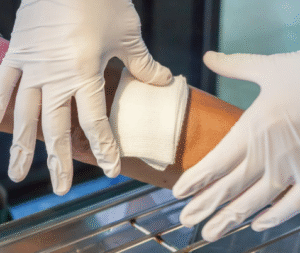Living with a wound that just won’t heal isn’t something anyone should accept as normal. Whether you’re recovering from surgery, living with diabetes, or dealing with radiation or trauma-related injuries, ignoring the pain only allows complications to worsen. The truth is that wounds are complex. Even something that starts as a minor cut can become a serious medical issue if it doesn’t heal properly. According to recent studies from the National Institutes of Health, up to 15% of patients with diabetic foot ulcers will require amputation if advanced care is delayed. That number underpins just how important it is to seek help early.
At the Angeles Wound Care Institute in Bend, Oregon, Dr. Adam Angeles, a board-certified plastic surgeon and wound specialist with more than 25 years of experience, leads a team devoted to helping patients recover comfortably and completely. By combining advanced techniques, tailored treatment plans, and compassionate care, the AWCI team helps you heal faster and get back to living your life without chronic pain or infection.
Below are six reasons why choosing a wound care clinic could be one of the most important health decisions you ever make.
1. You Heal Faster and More Completely
Specialized wound care is about understanding how tissue regenerates and what factors may be delaying that process. Clinics like AWCI use proven techniques such as debridement, topical therapies, and negative-pressure wound therapy to accelerate healing.
According to a 2020 study published in the Journal of Vascular Surgery, patients treated in dedicated wound care centers experienced a 59% lower risk of major amputation compared to those receiving standard care. That kind of outcome is the result of specialized expertise and consistent follow-up.
2. You Get Personalized Treatment Plans
Every wound has a story. Some are caused by surgery, others by infection, radiation, or poor circulation. At a professional wound care clinic, your provider identifies the root cause before recommending treatment.
AWCI ensures each new patient receives a detailed evaluation and a care plan that’s personalized for their specific wound type and overall health. For instance, a diabetic foot ulcer requires a different approach than an ostomy or radiation wound. Dr. Angeles and his team tailor therapies that align with your unique needs, helping you avoid unnecessary pain and prolonged recovery.
3. You Reduce the Risk of Serious Infection
Infection is one of the leading causes of chronic, non-healing wounds. Once bacteria or pathogens take hold, they can delay healing and even spread to surrounding tissue. Early medical intervention can prevent this from happening.
A wound care specialist knows the subtle early signs of infection (things like increased warmth, swelling, or odor) that might not seem serious to the untrained eye. Clinics also use advanced tools to detect bacterial growth and apply targeted treatments like antimicrobial dressings or topical oxygen therapy before infection becomes systemic. Simply put, Bend Plastic Surgeon Partners with Angel Flight West to Deliver Advanced Wound Care to Rural Oregon Patients shows how wound care clinics help to heal you and keep you from ending up in the hospital.

4. You Address Chronic and Non-Healing Wounds Effectively
Some wounds simply don’t follow the normal healing process. If your wound hasn’t improved in 4 to 12 weeks, it may be considered chronic. These are often linked to underlying medical conditions like diabetes, poor circulation, or immune disorders.
Here, chronic wounds are treated with a multidisciplinary approach that addresses both the wound itself and the condition causing it. Dr. Angeles’ team often collaborates with primary care doctors, endocrinologists, or oncologists to ensure that all contributing factors are managed. By focusing on the whole patient and not just the wound itself, AWCI helps you break the cycle of recurring injuries and delayed healing.
5. You Improve Your Quality of Life
Living with an open wound can take a physical and emotional toll. Pain, limited mobility, and fear of infection can keep you from doing the things you love. Advanced wound care can restore more than your skin: it restores your confidence.
Recent studies show that patients receiving care at dedicated wound care centers report higher quality-of-life scores, improved mobility, and reduced hospital stays compared to those managing wounds at home or through general care alone.
6. You Gain Expert Monitoring and Long-Term Prevention
Even after a wound has closed, the risk of recurrence can remain, especially for patients with diabetes, vascular disease, or radiation damage. A wound care clinic doesn’t stop at healing; it teaches patients how to monitor, protect, and prevent future issues.
At AWCI, education is a central part of every treatment plan. Patients learn how to care for dressings, recognize early signs of infection, and make lifestyle adjustments that support healing. The team also provides long-term follow-up to ensure continued success, helping patients stay active and pain-free long after their initial visit.
Knowing When to Seek Help
It’s natural to wonder whether a wound needs professional attention. Here are a few simple guidelines:
- The wound hasn’t healed after 4 weeks.
- There’s redness, warmth, or swelling around the area.
- You notice drainage, odor, or increasing pain.
- The wound was caused by a bite, puncture, burn, or radiation.
- You have diabetes or a circulation issue.
If any of this sound familiar, it’s time to see a specialist. The longer you wait, the higher your risk of infection, scarring, and complications.
Take the Next Step Toward Healing
You don’t have to live in pain or uncertainty. Dr. Adam Angeles and our compassionate team provide the expertise, technology, and care you need to heal fully. We serve patients throughout Central and Eastern Oregon (including Bend, John Day, Klamath Falls, and Pendleton), offering hope to those who’ve struggled for far too long with wounds that won’t heal. Don’t wait another week living in pain. Contact us here at Angeles Wound Care Institute today to schedule your consultation and discover what personalized wound care can do for your recovery.


